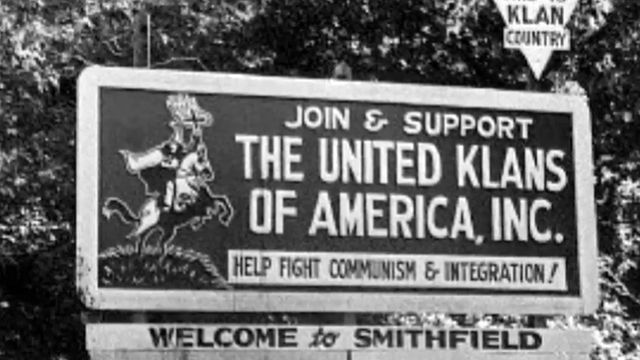UNC officials condemn old yearbook photos of students in Klan robes, blackface
University of North Carolina officials on Thursday condemned photos from UNC-Chapel Hill's 1979 yearbook that show some students wearing white hoods and robes pretending to lynch another student in blackface.
"There's a number of things about our past that we need to understand and deal with," UNC Interim President Dr. Bill Roper said. "That's a horrific part of our past, one that I think has no place then or now in our university system."
The comments were made during a news conference to introduce Kevin Guskiewicz as interim chancellor of UNC-Chapel Hill, and Guskiewicz likewise said he was "disheartened" by the photos.
"I don't believe that reflects what the university is about today, nor can I believe that it represents what it was about in 1979," he said.
The controversy loomed over Guskiewicz's first day in office in much the same way that the future of the "Silent Sam" Confederate monument hung over the final months of his predecessor, Carol Folt's, tenure as chancellor.
Protesters pulled "Silent Sam" from its century-old perch on the UNC-Chapel Hill campus last August, and Folt brought in crews last month to remove the pedestal and other markings in the middle of the night.
The UNC Board of Governors, which is working with UNC-Chapel Hill officials on what to do with the monument, then ushered Folt out of office four months before she had planned to retire. The board is expected to consider recommendations on Silent Sam's future in March.
Roper said neither he nor Guskiewicz want the monument returned to the Chapel Hill campus, but they have to follow the process the Board of Governors has in place.
"[We're working] in a lawful and respectful manner to create a way forward that allows us to learn from our past and then be prepared for the future in a good way," Roper said.
When asked to elaborate, he responded, "This day is not about Confederate monument day. We'll get to that in due time."
Profs: Klan's stronghold in South played role
The yearbook pictures appeared on a page for the Chi Phi fraternity. UNC officials say the yearbook was and continues to be designed and created completely by students.
"The photos found in the 1979 student yearbook are abhorrent," Vice Chancellor for Communications Joel Curran said in a statement. "We fully and wholly condemn both the photos and the racist behavior they depict. That kind of behavior has no place on our campus now or then."
"I was really disappointed. It hits close to home – it’s right here, it’s my school," said Daniel Ligons, a junior at UNC-Chapel Hill. "For it to be right here in Chapel Hill, it was pretty sad.
"Just to go along with the whole Silent Sam thing that we were dealing with for so long, adding this, it’s rough," Ligons added.
The pictures did stir condemnation by The Daily Tar Heel student newspaper in the spring of 1980. An editorial stated, "it is difficult to comprehend why anyone would commemorate an act so brutal and cruel."
David Cunningham, author of "Klansville U.S.A." and a sociology professor at Washington University in St. Louis, said the Ku Klux Klan claimed more members in North Carolina than all other Southern states combined as recently as the 1960s.
"These were students who, at the time, probably had early memories – in terms of their communities – where the Klan may have had a significant presence. They may have hosted large rallies," Cunningham said.
The Klan staged rallies in downtown Raleigh as late as 1987, and a large billboard advertising the Klan stood along U.S. Highway 70 in Smithfield until 1977.
Kenneth Janken, a professor of African-American Studies at UNC-Chapel Hill, said the Klan experienced a great deal of pushback during the 1970s and 1980s, which likely created anxiety among some whites.
That anxiety often expressed itself in costuming and mocking black people, Janken said, calling the displays "malignant."
Virginia Gov. Ralph Northam and Virginia Attorney General Mark Herring have come under fire recently for acknowledging wearing blackface at college parties in the 1980s.
"I think there was less of a broad awareness of what those kinds of characters signaled," Cunningham said.
The Daily Tar Heel editorial writer said Chi Phi was throwing an "Old South" party, a festivity not uncommon among Greek organizations, even into the 2000s.
Yearbook photos of students in blackface also have been uncovered at East Carolina University, and Chancellor Cecil Staton said in a statement that "incidents from 30-year-old yearbooks do not represent who we are today."
Cunnigham said the era when racial terror abounded continues to be glorified in the name of heritage – it just comes without shocking imagery of blackface and Klan robes.
"The Klan becomes sort of a device to say, 'Well, that's unacceptable,' whereas we see other symbols of the Confederacy and of that era that really document a similar culture," he said.











